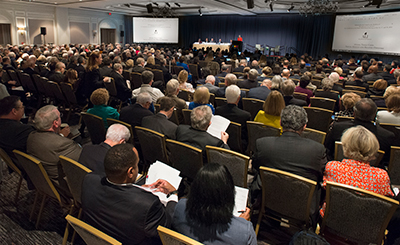The subject matter of this Restatement predates the birth of our nation. Some of the most important early decisions of the Supreme Court of the United States, including ones authored by Chief Justice John Marshall, deal with the Law of American Indians. And tribes, along with the federal government and the states, are one of the three categories of sovereigns in the United States. (Excerpted from the Forward of Tentative Draft No. 1 by ALI Director Richard L. Revesz)
This field is so informed by history, probably more than any other in some ways. … Certainly in the field of Indian affairs, a lot of damage has been done in the past, and there are a lot of challenges for the future just to get things right from the perspective of those of us who believe that tribes should have a voice in this society, and that there are good rules to help bolster that voice. (Excerpted from an interview with Associate Reporter Kaighn Smith)
The Official Text was published in 2022 and presents American Indian Law in six chapters: Federal–Tribal Relations, Tribal Authority, State–Tribal Relations, Tribal Economic Development, Indian Country Criminal Jurisdiction, and Natural Resources.
Reporters
Matthew L.M. Fletcher
Reporter, American Indian Law Restatement
Matthew L.M. Fletcher is the Harry Burns Hutchins Collegiate Professor of Law at University of Michigan Law School. He teaches and writes in the areas of federal Indian law, American Indian tribal law, Anishinaabe legal and political philosophy, constitutional law, federal courts, and legal ethics. He is a member of the Grand Traverse Band of Ottawa and Chippewa Indians and sits as the Chief Justice of the Pokagon Band of Potawatomi Indians and the Poarch Band of Creek Indians.
Wenona T. Singel
Associate Reporter, American Indian Law Restatement
Wenona T. Singel is an Associate Professor of Law at Michigan State University College of Law and the Associate Director of the Indigenous Law & Policy Center. She served as Deputy Legal Counsel for the office of Governor Gretchen Whitmer from January of 2019 through January of 2021, advising Governor Whitmer on tribal-state affairs. Her other professional activities have included serving as the Chief Appellate Justice for the Little Traverse Bay Bands of Odawa Indians and service as the Chief Appellate Judge for the Grand Traverse Band of Ottawa and Chippewa Indians. She is a magna cum laude graduate of Harvard College, and she received a J.D. from Harvard Law School.
Kaighn Smith, Jr.
Associate Reporter, American Indian Law Restatement
Kaighn Smith, Jr., leads Drummond Woodsum’s nationwide Indian Law Practice Group. He has represented Indian nations and their enterprises for more than 25 years in cases that focus on jurisdiction and sovereignty disputes, labor and employment relations, complex transactional disputes, environmental matters, and fishing and water rights.
The ALI Adviser is intended to inform readers about the legal topics and issues examined in many of ALI’s current projects; posts do not necessarily represent the position of the Institute taken in those projects. Posts on The ALI Adviser are written by ALI project participants, ALI members, and outside sources. Completed work is available to purchase online.

